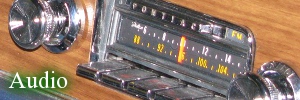















NASCAR Seeks to Attract African Americans to Sport |
|---|

 Topics: NASCAR
Topics: NASCAR
|
Susan Logue
July 7, 2005
Washington, D.C.
Audio Version 789KB RealPlayer
Audio Version 2,376KB MP3
The National Association for Stock Car Auto Racing - better known as NASCAR - counts more than 75 million fans in the United States who follow these loud, action-packed, big-money events. In fact, NASCAR races have become the country's fastest growing spectator sport. But it's a sport that relatively few African Americans have embraced, despite a history of black involvement in auto racing. More African Americans are being encouraged not only to come to the track but to get into the driver's seat.
Annual attendance at NASCAR races is nearing 7 million, and a single race can easily draw well over 100,000 spectators. But the sea of faces in the stands is predominantly white. "For so long, for so many years, I was one of those African Americans sitting in the stands with 250,000 people, [who] never saw anyone who looked like me," says Greg Calhoun, an Alabama businessman.
In an effort to encourage more African Americans - and other minorities -- to get involved with NASCAR, Mr. Calhoun developed Drive for Diversity. He says NASCAR officials were enthusiastic when he approached them with the idea. "They had open arms for me," Mr. Calhoun says. "They said, 'Go out and do it, we just think that you should include more than just African Americans. We think you should have minorities as a whole.'" Drive for Diversity aims to broaden minority representation among racing crews as well as drivers, and is supporting new roles for women, who already made headlines in other racing circuits when Danica Patrick placed 4th at this year's Indy 500.
But African Americans, perhaps more than other minorities, have long viewed the culture of NASCAR racing with suspicion. For one thing, in the American south -- where most NASCAR races are held -- some fans like to display the Confederate battle flag, which was flown by Confederate troops a century and a half ago during the American Civil War. Although many Southerners claim the Confederate flag is merely a symbol of southern pride, African Americans see it as a symbol of racism, an echo of the black slavery that formed the foundation of Southern culture.
"NASCAR understands what an important issue this is," says Tish Sheets, the group's director of diversity. "In any area that NASCAR controls, whether it is in the garage area, on our cars, on the uniforms, anywhere that we control, including our licensed products, you will never see the confederate flag."
But when it comes to fans displaying the Confederate flag, there is little NASCAR can do.
Bill Lester, currently the top-ranking African American driver in NASCAR, says he has noticed the flag, and while it isn't an issue for him, he recognizes that it does intimidate some fans. "I realize the flag is there. It's not as prevalent as it once was, but it's still there," Mr. Lester says. "The fact of the matter is nobody has taken a Confederate flag, waved it my face and made me feel uncomfortable. They can endorse their history, their tradition, whatever."
Not only has he never heard anything derogatory at a NASCAR race, Mr. Lester says, "the fact of the matter is, it's been a very welcoming environment for me. I feel very comfortable whenever I'm in the garage area, whenever I'm interacting with fans." He hopes that by sharing his positive experiences with NASCAR he can encourage "minority fans who are typically in the closet" to come out the races.
While African Americans may not be showing up in large numbers at NASCAR races, they do have a long history in the sport. That history is the subject of a new documentary film called Black Wheels, which points out that more than 50 years ago, an African American driver named Joie Ray was racing in NASCAR.
"I didn't do this to educate African Americans. I did it to educate current NASCAR fans," filmmaker Byron Hunter told an audience in Washington, where the film premiered. "I want everyone to know there is a history. There is a history of diversity."
In addition to bringing that history to light, Byron Hunter, who spent 2 years on the NASCAR and other motorsports circuits researching and producing Black Wheels, says he wants to "allow young kids to dream and see there is a future in NASCAR." That's something NASCAR wants, too, says, Tish Sheets, the group's director for diversity. Bringing more minorities into NASCAR makes the whole sport better, she says: "better competition, better business opportunities, better employment opportunities, and more fans."
